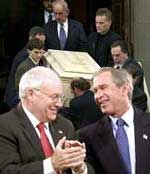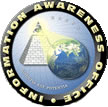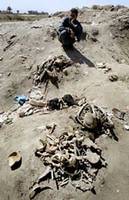
politician's little helper

Imagine a situation: a junior congressman faces a boring, six hundred page appropriations bill in which is hidden a scale-back in farming subsidies. The bill comes up for a vote in fifteen minutes, and the party leadership has "suggested" he approve it. Local farmers and their families in his district are routinely forced to go to food banks to feed their own families, while the agro-businesses that lobbied for the rider are reaping record profits for their stockholders. There will be no line item veto tonight. The power this legislator can unleash with a single word will bring hardship, hopelessness and unforgettable injustice. The air around him will be filled with the cries of hungry children, and he'll have to walk right through. Every value he learned as a boy tells him to vote "nay," to return to negotiations and find another way of greasing the lobbyists. Or, he reasons, he could complete the task and rush back to start popping pills that can, over the course of two weeks, immunize him against a lifetime of crushing remorse. He draws one last clean breath and raises his hand. "Aye," he says.
The U.S. Anti-Doping Agency (USADA) announced last Tuesday that as many as 83 federal lawmakers tested positive for CSD's (Conscience-Suppressing Drugs), experimental drugs which Dr. Leon Kass, chairman of the President's Council on Bioethics, called "morning-after pills for just about anything that produces regret, remorse, pain, or guilt." This afternoon, the Health Department requested a grand jury investigation into PhRMA, the Washington lobby representing US drug manufacturers and its new president and CEO, outgoing chairman of the House Energy and Commerce Committee, "Billy" Tauzin (R-La), for possible drug and money laundering violations.
A person describing himself as "an anonymous highly placed official" called the US Anti-Doping Agency to say he knows of several lawmakers using an undetectable conscience-suppressing substance. The official provided a syringe for testing and named a San Mateo County man, Victor Conte, and his lobbying firm, PhRMA, as the source of the CSD contained in the syringe. The agency then notified federal authorities of the discovery of a previously undetectable designer CSD and named PhRMA, through its subsidiary, SNAC, or Scientific Nutrition for Advanced Conditioning, as the source of the drug. Agency chief Terry Madden said several lawmakers have tested positive for the drug, calling it a "conspiracy" of lobbyists, chemists and politicians that represents "intentional doping of the worst sort," and the largest conscience-suppressing drug scandal in U.S. history.
Agents of the Internal Revenue Service, the Food and Drug Administration and the San Mateo County Narcotics Task Force, along with a representative of the anti-doping agency raided the Burlingame home of Billy Tauzin's personal physician, Greg Anderson, seizing suspected CSD's, $60,000 cash and computer and paper documents with the names of several congressmen and details of their use of conscience-suppressing drugs. "It's no secret what's going on in Washington," said one congressman. "At least half the guys are using CSD's." Former California Representative, Jose Canseco said he thought the problem was bigger, estimating about 80 percent of Capitol Hill was on the juice. And then-Arizona Senator Curt Schilling told the Washington Post: "CSD's are incredibly prominent; I don't think there's any question about that. ... It has enhanced numbers into the stratosphere."
Tauzin himself has denied using such conscience-suppressing drugs. "You can test me and solve that problem real quick," he said. ". . . To me, in politics it really doesn't matter what you do; you still have to make that payoff. If you're incapable of making it, it doesn't matter what you take. You have to be able to produce. I think conscience is really irrelevant to the game of politics." Tauzin attributed his success in securing the $2 million a year position with PhRMA to talent and hard work.
For example, he played a leading role in shepherding through Congress last year the Medicare prescription drug bill - portrayed by the administration as a boon to the elderly - that will bring a windfall of as much as $200 billion for the US pharmaceuticals industry. Tauzin was widely credited for language appearing in the bill ensuring that Medicare will pay full price for pharmaceuticals and barring the importation of much cheaper drugs from Canada to the obvious detriment of seniors.
Tauzin claims his elevation on retirement from the public sector to chief executive of one of the world's largest lobbyist firms is nothing more than a payoff for services rendered, but his relationship with his new employers has underscored speculation that his late-career assault on the all-time corporate welfare record was CSD-fueled. By the start of the 2002 session, there were already growing questions about what Tauzin might be doing to enhance his performance. After he secured the highest salary ever paid an ex-congressman turned Washington lobbyist, he was asked about CSD's.
CSD's first made headlines early in 2003 when the Pentagon announced they were developing drugs to help soldiers suffering from Post Traumatic Stress (PTSD). "Feelings of guilt and regret travel neural pathways in a manner that mimics the tracings of ingrained fear, so a prophylactic against one could guard against the other," Gen. Richard Myers, said at the time and pointed to several current lines of research, some federally funded, which he said "show strong promise for this."
At the UC Irvine, experiments in rats indicate that the brain's formation of memories can be inhibited softening the emotions they evoke. At NYU, researchers are mastering the means of short-circuiting the very wiring of conscience. At Columbia one Nobel laureate's lab has discovered the gene behind a conscience-inhibiting protein, uncovering a vision of "primal aggression" at the molecular level. In Puerto Rico, at the Ponce School of Medicine, scientists are discovering ways to help the brain unlearn conscience and inhibitions by stimulating it with magnets. And at Harvard, survivors of car accidents are already swallowing propranolol pills, in the first human trials of that common cardiac drug as a means to nip the effects of trauma in the bud.
An indictment handed up by a federal grand jury, however, charges that, while they are not approved for sale in the US by the FDA, a black market for CSD's opened up in Iraq some time prior to the publication of prison abuse photographs by the British in 2003 and that CSD use may have played a part in that incident, at least as far as the souvenir photos were concerned. Two British and two US prison guards tested positive for CSD's and are facing possible four weeks suspended pay and extra duty each.
PhRMA claims its advances into the shadowy field of memory and remorse are not intended to produce morally anesthetized grunts and political hacks. "We're trying to fend off post-traumatic stress so that women who've been raped can leave their houses without feeling like targets. So that survivors of terrorist attacks can function, raise families, and move forward. So that young soldiers aren't left shattered for decades by images of dead children and the screams of tortured prisoners. And yes, so that those influence peddlers we send to fight for us in Washington are not paralyzed with shame by what they've seen and done in public service." said Tauzin's press secretary. PhRMA nevertheless voluntarily canceled its Washington laboratory license, citing "adverse financial circumstances."
But some researchers are worried that CSD abuse in the government only makes it easier for moral atrocities to be committed. "If you have the pill, it certainly increases the temptation for the congressman to blur the line between lobbying and bribery, if he thinks he'll be numbed to the personal risk of remorse. We don't want politicians saying willy-nilly, 'Screw it. I can take my pill and even if signing this is not really ethical, I'll be OK,'" says psychiatrist Edmund G. Skinner, director of the Program on Medical Ethics at the National University of the Health Sciences. "If legislators are going to have that lower threshold, we might have to build in even stronger safeguards than we have right now against, say, knowingly misrepresenting the implications of proposed laws. We'll need a higher standard of proof [that a law is more than a kickback to financiers]."
James L. McGaugh, a neurobiologist at U.C. Irvine whose study of stress hormones and memory consolidation in rats is one of the cornerstones of the conscience-suppression research, acknowledges the ambiguities but comes out swinging in defense of his work. "Is it immoral to weaken the memory of horrendous acts a person has committed? It doesn't surprise me at all that politicians would wake up screaming, thinking of the young children they destroyed," McGaugh says. "But is treating that worse than saying, 'Don't worry if your constituents hate you, we've got a huge war chest and voter software to prevent you from getting kicked out of office'? Why is it any worse to give them a drug that prevents them from having PSTD for the rest of their lives? The moral dilemma is sending corporate whores to represent the interests of poor people in the first place."
But veteran lawmakers torn apart by PTSD don't have a choice about being Exhibit A in the case against Washington politics. "When you see what can happen to a page or a junior congressman, it passes on in a very real way, not in a history-class sense, that reality of what political power really is," Kass says. "Who are we to impose this emotional albatross on public servants? As a nation, we pretend to elect our leaders. It seems unjust to make them a special class to suffer for our sins over wrongheaded laws, or pay a continuing emotional price for securing their future careers."
"That's a heavy burden to put on people to preserve the obsolete morality you're talking about," says Dr. Roger K. Pavlov of Harvard University, who's leading a propranolol study on five Special Forces soldiers from Ft. Bragg who violently stabbed their wives to death after returning from Afghanistan in 2002. "By that same logic, if you could make a lightweight bulletproof garment for soldiers we still shouldn't do it. For moral reasons we ought to make them able to be shot, to preserve the cost of war, the deterrent to war. But we work to prevent our soldiers from being shot, and I say there are mental bullets flying around in Washington, too."
Nevertheless, fellow conscience-suppression researcher Dr. Gregory Quirk of the Ponce School of Medicine, in Puerto Rico, is troubled by how his work might be used. Quirk thinks a physician could stimulate areas of the brain with magnets while politicians view images of the people they've destroyed, and could thus restore balance to the mind. With that same method, he says, firemen could stave off episodes of life-threatening panic. "Certainly the military might be interested in something like that," he says. "If this would be used to go against moral conscience to kill people, I would have a problem with that."
The indictment of Tauzin claims that PhRMA produced the CSD's that supplied the Iraq market and furthermore that, through Tauzin, they had kept up a lucrative business on Capitol Hill since 1999. Sen. John McCain (R/D-Az) said in September that President Bush did not believe more than one or two lawmakers had used conscience-suppressing substances, but would back tougher testing standards, which, until now, were mocked and lambasted as everything from "a joke" to "worse than terrible." Current rules allow a lawmaker to test positive for CSD use five times before receiving a reprimand - and even then the language gives the vice president an option to fine a lawmaker rather than reprimand him. In the military, a soldier caught once can lose privileges for two months.
Since McCain's statement, however, the names of several senators who tested positive for CSD's have begun to leak out. And, in Washington, some of the world's most influential power brokers began appearing before the grand jury in a room on the 17th floor of the Merck Federal Building. The testimony was secret, but sources familiar with the proceedings said some of these elite politicians were reluctant participants until offered immunity for any truthful testimony. Then, many admitted knowing they had been getting illicit drugs from PhRMA. Some said they called their drugs "the clear" and "the cream." The clear was taken orally, and the cream was a lotion rubbed onto the body.
PhRMA sometimes flaunted its elite clientele. "We don't just hang out with elite politicians, they pay us large sums of money to advise them," a recent PhRMA email said. Another one read: ". . . elite politicians like Tom Delay and Billy Tauzin are routinely paid for their services to us in cashier's checks." The company boasted a client list that included scores of politicians from federal, state and local government. According to federal prosecutors, Tauzin was its premier client as well as its pied piper, bringing in star lawmakers from the Senate and House. "All of us wanted to deal with the guy," says Gregg Tafralis, a former congressman from Ohio and one of Tauzin's original customers. "The guy is the smartest son of a bitch I've ever met in my life."
On Dec. 4, Tauzin strode into the federal building wearing a gray sport coat, tie and dark slacks. He spent five hours behind closed doors, though only testifying for about half that time. What he said inside the grand-jury room is unknown. Officially, he denies the trafficking charge, claims he held no discussions with PhRMA about the CEO position during the time the Medicare bill was being drafted, and points out that numerous other lobbies publicly bid for his contract, including the Hollywood trade group MPAA and several telecommunications firms.
In 1997, however, Tauzin was chairman of the subcommittee on Telecommunications, Trade, and Consumer Protection, with jurisdiction over telephone, cable, wire, and Internet communications and commerce, as well as the Federal Communications Commission. He held other committee and subcommittee seats on panels with oversight of the oil and chemical industries. Contributions from these industries accordingly swelled his campaign coffers, although he was never to face a serious reelection challenge, and the balls just kept on sailing out of ballparks. The interest of these lobbyists in bidding for his contract is, therefore, no evidence against conscience-suppression in the final two seasons of his career.
There nevertheless was little doubt about who the eventual highest bidder would be. PhRMA is one of the wealthiest and most active political lobbies. The association and its member companies poured as much as $70 million into lobbying and campaign contributions in the 2002 election cycle, and much more during the current year, counting contributions to both presidential and congressional campaigns.
Tauzin claims that any drugs PhRMA may have supplied him were for a bleeding ulcer that was later diagnosed as a rare form of cancer, for which he was successfully treated. Few details of this health crisis have been released, but the irrepressible congressman volunteered that he had been using an experimental drug made available by a leading pharmaceutical firm, an experience that has reinforced his gratitude to his new employers. According to the indictment, however, Tauzin received more than testing and ulcer medicines from PhRMA; records show that his wife, Julie, told investigators that he obtained propranolol from them on several occasions. PhRMA denies being the source of black market CSD's, questions whether they really are banned substances, and says that they're the victim of jealous and hypocritical liberals.
For doctors, the drugs present a tricky dilemma. Most people exposed to horrific situations don't end up with PTSD, but there are few means of knowing on the spot who might need treatment much further down the line. Patients are supposed to take CSD's soon after ruthless or shameful behavior. There is evidence, however, that CSD abusers tend to try to curb normal emotional responses by taking the drugs beforehand so that pangs of conscience don't impede their performance. Having thus unplugged their conscience before committing a morally repugnant act, they are not subject to remorse afterwards or "the full sting of self-examination."
"The idea is to help people to not fall apart," says Dr. Skinner, "and preventing remorse is far more effective than treating it." But a conscience-born irrational aversion to influence peddling? Moral scruples in the face of lucrative opportunities? isn't healthy either. "Such emotions can blind us as well as make us wiser," says Pavlov. "It's possible that these kinds of drugs would help lawmakers see in a clearer way."
An uncomfortable reality is that lobbying by gargantuan corporations isn't an aberration; it has a very codified place in our political economy. We agree through regulations to normalize it. We demand punishment for politicians who violate those regulations, though more often those from the opposing party. But we don't deny them medical treatment. And one needn't have committed a crime to feel wracked by remorse. "In my dreams I meet six New Yorkers I screwed over. Whether I did it legally or not is irrelevant," says Sen. Hillary Clinton (D/R-NY).
Further indictments, already predicted by one defense lawyer, could come early next year. PhRMA is suspected of laundering funds generated through the sale and distribution of controlled substances. If the investigation proceeds to criminal prosecution, the testimony of the lawmakers could become public. Some could find themselves testifying about drug use in open court. PhRMA's attorney, Robert Holley, has predicted the doping scandal could become "bigger than the Kobe Bryant case when you talk about the way politics are looked at in the United States."
McCain says that the Bush administration will begin enforcing its much-criticized anti-doping policy in the next session, but he thinks the voters will impose their own judgment.
"I think the public will put its own asterisk (on all the records), even if Washington doesn't," McCain said. "The sad thing about Tauzin is that Americans are so jaded, they'll probably look at him exactly the way they did before all these drug allegations." Many observers concur that, in the end, all parties will agree to address the issue through further de facto limitations on drug testing.

















